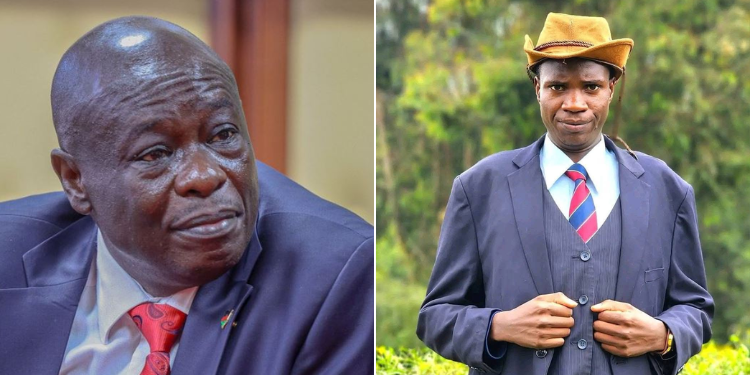A tribute shared by former deputy president Rigathi Gachagua following the death of comedian KK Mwenyewe has stirred controversy online, with many influencers criticizing the gesture as insincere and overdue.
The popular content creator, celebrated for his hilarious impersonations of Gachagua, passed away after being hospitalized. News of his death prompted an outpouring of grief across Kenya, but it was Gachagua’s emotional message that drew sharp criticism from fans and fellow creatives.
In his tribute, Gachagua praised KK as a uniquely talented and resilient young man who used comedy to communicate powerfully and meaningfully with the public. He described KK as a consistent performer whose creative spark connected with many Kenyans, often delivering satire that resonated with the nation’s social and political climate. Gachagua went on to express heartfelt condolences to KK’s family and the entire creative community, calling him a true champion of comedy whose legacy would live on.
However, this tribute didn’t sit well with several influencers and online personalities, many of whom questioned why Gachagua had ignored KK when he was alive—especially since the comedian had publicly expressed his desire to meet the politician. According to the tribute, Gachagua claimed his team had reached out to KK, but a meeting never happened. That explanation failed to convince many of KK’s fans.
Voices from the digital space called out the politician, branding his tribute as performative and opportunistic. Several pointed out that while KK’s content boosted Gachagua’s popularity and public image, there had been no visible effort on his part to acknowledge or support the young man during his lifetime.
One influencer remarked that Gachagua had once opted to publicly support a different content creator, even when KK was trending and had more widespread appeal. Another commented bitterly that in Kenya, recognition only seems to come after death. Others accused the politician of trying to ride on KK’s fame posthumously while failing to show up when it truly mattered.
The backlash was intense and emotional. Fans pointed out that KK had made countless videos mimicking Gachagua—often in good humour—and that such dedication deserved more than a delayed tribute. The sense of betrayal was heightened by the fact that KK had openly admired the deputy president and even longed for the opportunity to meet him.
Adding to the emotional weight of the situation was a resurfaced video of KK joking about death. In the skit, he performed a mock protest outside State House and danced playfully before simulated gunfire halted the act. The screen then cut to a symbolic image of Jesus, with KK acting confused, as if suddenly realizing he had passed on. Many who watched the clip in hindsight saw it as a chilling and eerie foreshadowing of the tragedy that followed.
The overall sentiment among Kenyans was clear: KK Mwenyewe was a gifted comedian who deserved support and recognition in life—not just in death. His untimely passing has sparked a larger conversation about how society, leaders, and the entertainment industry treat upcoming talents—often ignoring their pleas until it is too late.

